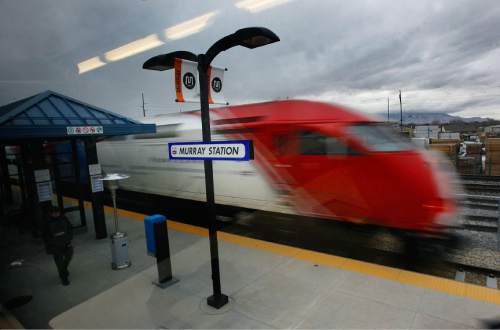This is an archived article that was published on sltrib.com in 2015, and information in the article may be outdated. It is provided only for personal research purposes and may not be reprinted.
A rail-car maker at the center of a recent controversial Switzerland trip by Utah Transit Authority board members and state lawmakers will open temporary operations in Utah, the Governor's Office of Economic Development (GOED) announced Thursday.
Stadler Rail Group, based in Bussnang, Switzerland, is considering Utah and two other U.S. locations for a permanent manufacturing facility. The others are said to be Dallas/Ft. Worth and Atlanta.
Utah's incentive package to attract that long-term operation, approved Thursday, amounts to $10,068,900.
All but $500,000 of that would be a tax rebate after the plant is operational and living up to promises to provide 1,000 new jobs over the next 15 years. Those jobs are supposed to pay 110 percent of Salt Lake County's average wage.
The other $500,000 would be given to Stadler as a two-phase grant. The first $250,000, which must be matched by the company, would come when it moves into the temporary facility, where rail cars would be assembled for the transit agency in Texas.
"We're very excited to build the Texas train in Utah," said Stadler Rail USA President Martin Ritter. "Obviously, this is an important step in the history of the company."
The second $250,000 matching grant would be released later if Stadler decides to make the arrangement permanent, said GOED board member Jerry Oldroyd.
He said two Utah sites are being considered by the Swiss company, which will be entering the U.S. market so it can meet legal "Made in America" requirements to supply the Texas transit district.
One is at Warm Springs in North Salt Lake, in conjunction with a UTA facility already there, Oldroyd said. The other is in Tooele County.
"This will be a good opportunity for our workforce and good for us internationally," he said, noting that efforts to bring Stadler to Utah began two years with a trip to Switzerland by Jeff Edwards, a GOED board member and president of the Economic Development Corp. of Utah.
"This is an A-list company," Edwards said. "These are the kinds of folks we want. We could not have picked a better corporation to come into the state."
Theresa Foxley, GOED's deputy director, said her agency started courting Stadler seriously in March, met with company officials again in June, then began the incentives negotiations.
"The first two years are a job interview for the state of Utah," she said, "making sure their workforce needs are met and they feel welcome, so that when it comes time to make a long-term investment, they make it here."
"Without getting the temporary facility, we couldn't compete for the long-term," she added. "To get a flagship project like this is a feather in the cap of Utah."
Oldroyd said Stadler's presence fits Gov. Gary Herbert's desire to increase foreign investment in the state, particularly where there "is a good and honest impact with the jobs it brings."
The nature of those jobs also is invaluable, he added, because they will give Utah workers a new expertise not available in other parts of the country.
"It helps diversify our base, providing jobs we don't have, training we don't have, markets we don't have now," Oldroyd said. "This is a shining star."
Nothing was said at Thursday's GOED session about UTA or a controversial trip to Switzerland that involved meetings with top-level Stadler officials.
The September trip was organized by House Speaker Greg Hughes, a former UTA chairman, and attended by two UTA board members and agency lobbyists, along with several lawmakers.
The trip caused an uproar because it was revealed to have been funded by private sources, including a political action committee bankrolled largely by UTA contractors. The trip wasn't publicly disclosed until after the Nov. 3 election on raising sales taxes for transportation and transit.
The outing was reported by news outlets that obtained documents through an open-records request following an anonymous tip.
Also revealed in the documents was that UTA had sought and won federal approval to award a lease of its Warm Springs FrontRunner locomotive maintenance facility under a sole-source, no-bid contract to a different rail-car manufacturer, Wabtec.
But UTA reversed course on that plan when Stadler expressed interest in leasing the facility, and opened up the project to bids.
The bidding was suspended when UTA belatedly discovered that two of its board members had met with Stadler officials during the Swiss trip. But the bidding resumed after UTA banned the pair from any discussion or decision-making in the matter.
One of those board members, Vice Chairman Chris Bleak, has since resigned. The other, former state Sen. Sheldon Killpack, may yet be asked to step down early by Hughes, the House speaker who appointed him to the UTA board.



